Elizabeth Graver's Blog
October 30, 2025
New short story, “Little Red Schoolhouse,” is out, following the same family as Kantika
One of the biggest challenges of writing my novel Kantika, with its story inspired by my endlessly unfurling family history, was figuring out where to begin and where to end. At one point, I had a chapter set in 1957 New York about my mom’s (true!) battle—as an idealistic, knowledge-seeking college student, the left-leaning child of Sephardic immigrants—with the administration of Queens College over academic freedom. It didn’t make it into the book, but current times being what they are, the story kept calling out to me, and so, with the continued help and blessing of my ever-inspiring mom, Suzanne Graver, I reworked it into short story form. Thank you, The Adroit Journal, for giving it a home and naming it an Editors’ Prize finalist. You can read the story in its entirety here.
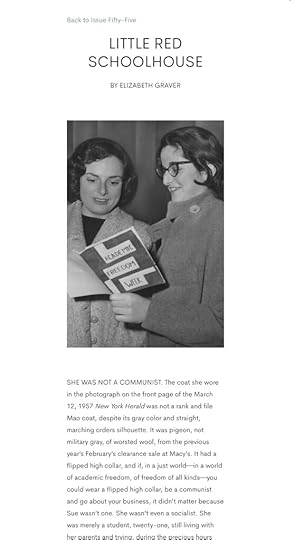
The post New short story, “Little Red Schoolhouse,” is out, following the same family as Kantika appeared first on Elizabeth Graver.
September 25, 2024
“Searching for My Father’s Story, Finding a Tantalizing Grandfather,” for the Boston Globe
I wrote a meditation for the 9/25/2024 “Writer’s Journal” column in The Boston Globe about looking for a grandfather I never knew…
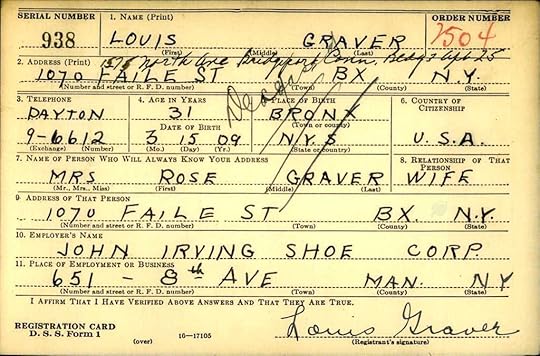
I GO LOOKING FOR MY GRANDFATHER, Louis Graver, who died in 1944, twenty years before I was born. He went by Lou, which is also my parents’ nickname for me, though it’s only now, a few weeks after my sixtieth birthday and long after my father’s death, that I notice the twinning of the name.
The story goes that Lou Graver came home from work one day complaining of a headache, lay down on the bed and died. A cerebral hemorrhage, supposedly, though my father had a memory of blood (maybe Lou fell during the event?) and of his mother calling save him, Larry, save him!, but my dad was only twelve, a skinny, smart boy with curly black hair and ears that stuck out and a communist shoe salesman father he adored but who couldn’t keep a job, and there was no saving to be had.
I’m looking for my grandfather in order to write about my father, in order to also write (if I dare) about myself. I won’t really know what I have to say until I say it, and if my prior experience is any indication, the road will have many twists and turns. Doing research as a writer isn’t new to me. Before the Internet, it mostly happened in the library. For my first novel, “Unravelling,” set partly in rural New Hampshire, I remember going to the stacks to research how to slaughter a pig, but the temptations were many, and I stumbled upon a book that described how to insulate a house by surrounding it with a bank of dead leaves. I was early in the process but knew that this — the nest of leaves rising up, damp and fecund, insect-filled, rotting, protecting — would set the scene for the end of my novel. It took me years to get there, but I did.
Early on, I researched worlds, not real people, but over time I began to investigate my own family history, which feels ever more fleeting as I age. My last book, “Kantika,” imagines the migration journey of my maternal grandmother, a Sephardic Jewish woman born in Turkey. Though I wrote it as a novel, it relies heavily on fact, beginning with recorded interviews I did with my grandmother when I was 21 and she was close to the end of her life. I include family photographs and some real names, along with invented characters and scenes. It’s a “true novel,” or “roman vrai,” to borrow a term from French writer Anne Berest, whose powerful novel “The Postcard” straddles genres in similar ways.
This time, I might try nonfiction, or maybe not. I’m only just beginning; much can change. It being 2024, I look for Louis on the Internet. Ancestry.com, with its jaunty green leaf clues, turns up censuses with addresses in the South Bronx, as well as in Bridgeport, Connecticut, where Lou died. I go on a pilgrimage with my nephew Jacob (middle name Louis) to several addresses. On Faile Street in the Bronx, where my dad lived with his parents and maternal grandparents as a little boy, we find only a modern basketball court at the address, but down the street, we come upon a Fellowship Baptist church with a Star of David peeking faintly out from behind a pane of glass above its faded blue sign. The census told me that my father’s grandfather, Benjamin Pearlstein, was a Hebrew teacher. Maybe he climbed these five stairs to teach in this shul, coming home (one of just a handful of things my father told me about his childhood) to argue bitterly with his son-in-law Lou, the communist.
Through the Freedom of Information Act, I obtain my grandfather’s FBI file, where an informant, whose name is redacted, describes tracking Louis Graver in the months before his death. I learn that Lou joined a communist book group, and that he figured out the location of the undercover communist party headquarters in Bridgeport because he saw a white man talking to a Black man in an upper story window — an unusual sight at the time that led him to investigate. I learn that Lou, who never graduated high school, wrote for leftwing and Jewish publications, though when I search for his name in The Daily Worker and The Forward, I find only “graver danger” and “grave risk.” I write to an historian, who tells me that Louis probably wrote under an alias to protect himself. Just when I’m about to give up, I find one brief mention of him in the Daily Worker in a 1936 article about a Boot and Shoe Workers union protest, where he was arrested for “loud talking” by Patrolman Green.
For every hole, I find a nugget, and another hole. I talk to two second cousins I meet online through Ancestry, who share some things about the family that feel private and painful enough that I must wrestle with whether to put them in or leave them out. Slowly, a person starts to form in my mind, though the line between fact and imagination remains blurred. Louis Graver, I learn from his draft card, was a slight man. 5′ 6′’, 120 pounds. He had brown eyes, brown hair, light brown skin. He was rejected from the draft; I haven’t yet figured out why. The “G” in his signature looks like my dad’s.
I’ve been missing my beloved father for fourteen long years, but now, weirdly, I also miss his father Lou, whose name, in a certain way, I bear. Did my father notice the echo? I will never know, and so I wonder, ponder, research. Write.
Elizabeth Graver’s fifth novel, “Kantika,” was awarded the Edward Lewis Wallant Award, the Julia Ward Howe Award, the Massachusetts Book Award for Fiction, and a National Jewish Book Award. She teaches at Boston College.
[image error]The post “Searching for My Father’s Story, Finding a Tantalizing Grandfather,” for the Boston Globe appeared first on Elizabeth Graver.
September 4, 2024
Kantika Wins the Massachusetts Book Award for Fiction
[image error]I’m thrilled to learn that Kantika has received the Massachusetts Book Award for Fiction from the wonderful Massachusetts Center for the Book, with a ceremony at the State House on October 8th. I feel so lucky to live in a state with such a rich literary history and current scene and to be, with this award, in the company of dozens of writers I admire, both on this year’s list and from years past. I was born in California but was whisked away to Massachusetts when I was a newborn (my parents were waiting for me to be born before they could move east for my father’s job as an English professor at Williams College, in Williamstown, MA, a jewel of a town nestled in the northwest corner of the state). While I left Massachusetts for college, grad school and a few wonderful years in Paris, and while I love to travel far and wide, New England always calls me home. This place—its mountains, woods and fields, shorelines, towns and cities, its seasons, its people—is my homeplace.
Kantika tells the story of a radical diaspora, but when I plant my seeds and pick the peaches from my tree and welcome home my grown children to the antique yellow farmhouse where I live, I often think of my grandmother Rebecca, who inspired my novel. Her life circumstances forced her to leave Istanbul, the place where she was born and that she loved most of all, but she knew how to make a home anywhere, and she passed that on her love of the ground beneath her feet to her family. My sister, mother and I all garden in Massachusetts, sharing cuttings, clippings, bulbs and roots. The fact I’ve been able to make an enduring home here is, in a world so full of rupture and forced leavings, a piece of extraordinary good fortune. I wish my grandmother were alive to clap and sing out in her inimitable way upon learning of this beautiful award.
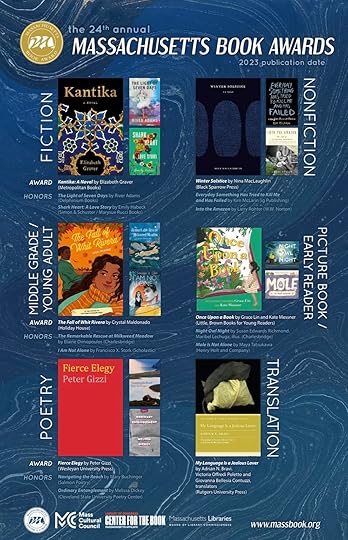
The post Kantika Wins the Massachusetts Book Award for Fiction appeared first on Elizabeth Graver.
May 9, 2024
Edward Lewis Wallant Award, Judges’ Remarks
“Elizabeth Graver’s Kantika is uniquely an American Jewish novel centered around Eastern Sephardi immigrants to the United States. Moving around temporally and geographically—Istanbul, Cuba, Barcelona, New York—the novel is, as the title suggests, a song. It is both a lament for lost worlds but also a love song, a prayer for the future. This is a novel about exile, about the diasporic nature of loss. As one character early on in the novel admits, ‘in addition to missing all the people and places she left behind…she is homesick for the one thing that is supposed to be portable and ever-present: her God.’ But so too, this is a novel about the rich intersections of cultures, languages—French, Ladino, Hebrew, English—and lives. Graver, in navigating worlds, temporalities, and generations, explores the possibilities for self-reinvention amid the turmoil of change, a story in which, as another character acknowledges, ‘One thing seems as plausible as the next.’ Indeed, this is a novel about storytelling and stories, ‘shape-shifting and unruly.’ The novel turns, unexpectedly, into the intimate story of a mother raising a disabled stepdaughter. Graver takes us into the consciousness of a child with a disability, and the stepmother who has to overcome prejudices to care for her, with such sharpness and insight that it made us want to recommend the book to everyone we know.”
Judges:
Victoria Aarons, Trinity University
Josh Lambert, Wellesley College
Avinoam Patt, New York University
Amy Weiss, University of Hartford
The post Edward Lewis Wallant Award, Judges’ Remarks appeared first on Elizabeth Graver.
May 8, 2024
Love, Richard: Remembering My Friend & Literary Agent, Richard Parks
My beloved friend and literary agent (until his retirement in 2015), Richard Parks, died on April 23, 2024. Carrying his never-ending encouragement with me, I plucked some words out of the sadness and wrote this little remembrance, which I published at Literary Hub. To take some liberties with the ending of Charlotte’s Web, “it’s not often that someone comes along who is a true friend and a good agent. Richard was both.” May his memory be a blessing. You can read my remembrance here.
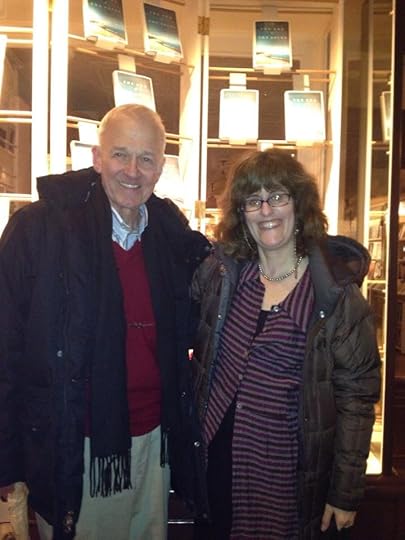
The post Love, Richard: Remembering My Friend & Literary Agent, Richard Parks appeared first on Elizabeth Graver.
April 11, 2024
Wallant Award Ceremony! Paperback Launch!
On April 15, I’m honored to be going to the University of Hartford to receive this year’s Edward Lewis Wallant Award for Kantika. My younger daughter, Sylvie, a college junior at Wesleyan University in nearby Middletown, CT, will be my date! Previous winners of the Wallant Award include many writers whose work I love, among them Peter Orner, Edith Pearlman, Joshua Henkin, Ayelet Tsabari (whose forthcoming novel, Songs for the Brokenhearted, is a gorgeous book to opened my eyes to the history of Yemeni Jews in Israel), Allegra Goodman, Nicole Krauss, and, reaching further back, Cynthia Ozick and Chaim Potok. What company!! Would that we could all gather around a table at the same time. The event, from 7-9pm at the University of Hartford and on Zoom, is open to the public. You can sign up for either the in-person or Zoon option at this link.
The next day, April 16th, is the publication date for the US paperback edition of Kantika. I’m extremely grateful to everyone who has read and reviewed this novel, as well as to all the people and organizations who’ve invited me to speak, written to me, and shared their own family stories in all their heartbreak, persistence and joy. To have Kantika continue its journey through the world in this new paperback form is a gift. I’ll be doing fewer events this time around (teaching! writing!) , but I still do have quite a few scheduled, both in-person and on Zoom (see my events page for details).
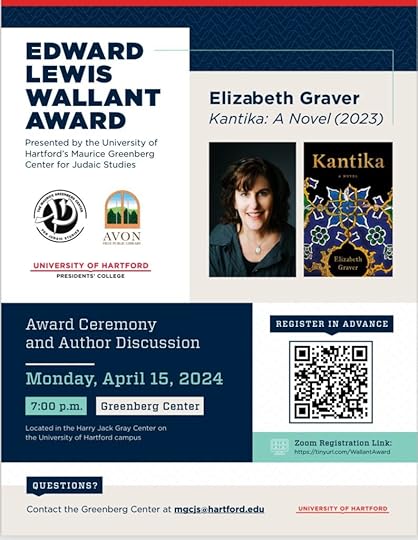 Screenshot
ScreenshotThe post Wallant Award Ceremony! Paperback Launch! appeared first on Elizabeth Graver.
April 4, 2024
Video of “Wandering Jews: Two Diasporic Journeys Out of the Ottoman Empire, with Elizabeth Graver & Jordon Salama
I had the huge pleasure of doing an event at the Jewish Museum in New York City last week, following two days of festivities and a panel for the Jewish National Book Awards (Kantika received the award for Sephardic Culture). Titled “Wandering Jews: Two Diasporic Journeys Out of the Ottoman Empire,” the 4/28/24 event was part of the “Unpacking the Book Series,” moderated by Unorthodox podcast host Stephanie Butnick, who asked such thoughtful questions. We were in conversation with Jordon Salama, whose second book (and he’s only twenty-seven!), Stranger in the Desert, is a moving, layered exploration of his journey through the Argentine Andes as he explored his family’s Syrian and Argentinian roots. The book is full of surprises, and Jordon was a wonderful conversation partner. We found many echoes between our family’s stories: multilingualism, a fluid sense of home, the importance of stories in diaspora, little known corners of Jewish identity and history, interviewing our grandparents, being dogged about our own quests, finding pleasure in the unexpected, and more. You can watch the video of the event here.
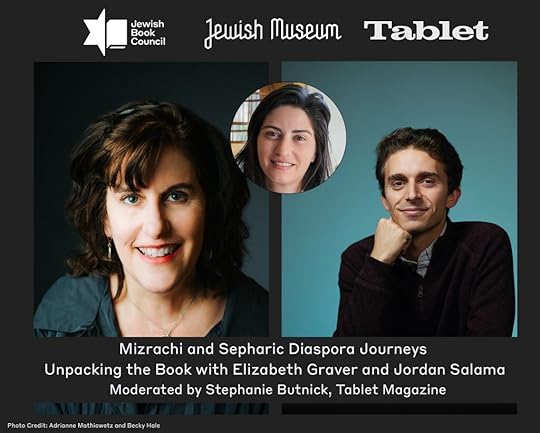
The post Video of “Wandering Jews: Two Diasporic Journeys Out of the Ottoman Empire, with Elizabeth Graver & Jordon Salama appeared first on Elizabeth Graver.
March 26, 2024
Kantika Paperback Book Tour!
The paperback of Kantika comes out in April 2024, with early copies making their way out into the world already! I’m excited for a number of events, both virtual and in-person, where I’ll have the chance to continue to share this story, so close to my heart, with readers, and have conversations with an amazing array of writers, thinkers and human beings. Among the highlights are a conversation in New York City on June 4th with my amazing sister, Dr. Ruth Graver, psychiatrist and psychoanalyst, moderated by novelist Lisa Gornick. We’ll talk about family stories—both our own and in the context of psychoanalysis and writing fiction. On June 7th, I’ll be in conversation in Wickford, Rhode Island with my dear friend from college, writer and literary and disability rights scholar Ralph Savarese; we’ll be hosted by another amazing Wesleyan pal, Spencer Reese, a beautiful poet, priest and painter. On May 16th, I’ll be at UCLA in conversation with Michael Frank and Sarah Abrevaya Stein, both of whom have written dazzling and deeply moving books about the Sephardic experience. And there’s lot’s more. Please join me on-line or in person. Here’s the schedule (see Events for more details):
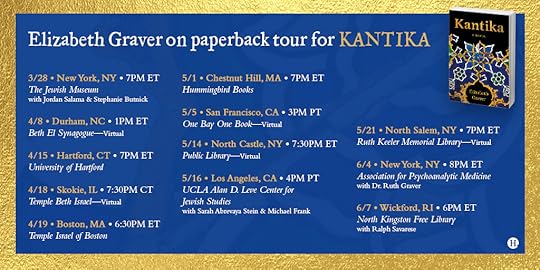
The post Kantika Paperback Book Tour! appeared first on Elizabeth Graver.
January 27, 2024
Kantika Receives a National Jewish Book Award
When, a few days ago, I received the wonderful news that Kantika had won a National Jewish Book Award—the Mimi S. Frank Award in Memory of Becky Levy—I was stopped short by the fact that Becky Levy shares a name with my grandmother, Rebecca née Cohen Baruch Levy—the inspiration for and central subject of my novel. Quickly, though, my surprise turned to something else, an of-courseness, as in of course they share a name, just as of course I stumbled, in my research, on a 1929 film containing unattributed footage of my family, and of course I was welcomed with open arms by the many people I asked (often out of the blue) for help—relatives and scholars, residents of Istanbul’s Oryom Old Age Home, musicians, Ladino speakers, fellow writers, my editor, Riva Hocherman, who saw the soul of the story and helped me draw it out. While the Sephardic world I encountered contains plenty of hardship and doors slammed shut, it is also notable for being full of hopeful crossings—geographic, linguistic, cultural, religious—and for brimming with stories and song. The journey I took to write Kantika was full of generous people across several continents. I’m deeply grateful to everyone who welcomed me, and to the Jewish Book Council and its judges for the award.
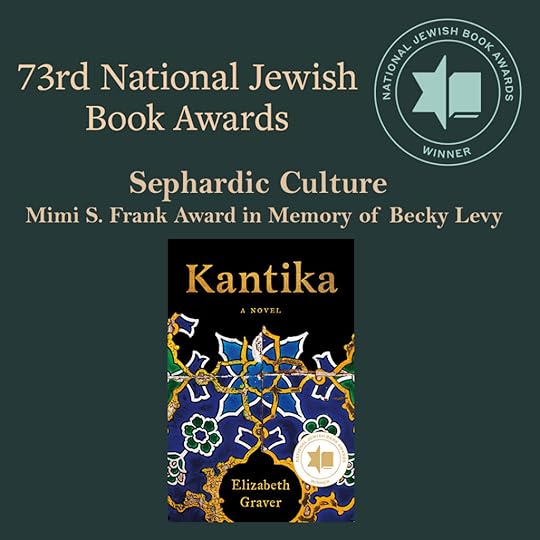
The post Kantika Receives a National Jewish Book Award appeared first on Elizabeth Graver.
September 22, 2023
One Bay One Book Lecture Series Around Kantika
I was so excited to learn that Kantika had been selected as this year’s book for San Francisco’s Jewish Community Library’s “One Bay One Book 2023 program,” and even more excited when I saw the line-up of virtual lectures the program has organized around the themes of the book. Running from November through late Spring (when I’ll give a virtual talk as part of the series, date still tbd), the talks range in topic from Sephardic music, to Jewish Cuba, to Jewish life in medieval Spain, Ladino, immigration to the US, and more. On December 3rd there will be an in-person discussion at the Jewish Community Library of Anne Berest’s beautiful novel The Postcard, which has some echoes with Kantika in how it’s a novel inspired by a real family story and explores Jewish history—in Berest’s case, the Holocaust—through the intimate lens of the author’s family’s experience. Some of the people giving the lectures helped me with my research as I was writing Kantika. I still have much to learn and remain fascinated by the topics so plan to attend as many events as I can. You can find the events and registration links here and read an article about Kantika having been chosen by the program here.
The post One Bay One Book Lecture Series Around Kantika appeared first on Elizabeth Graver.



